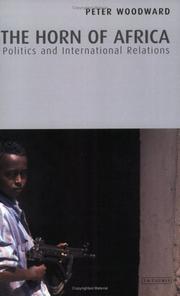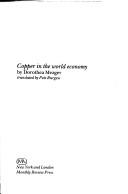| Listing 1 - 5 of 5 |
Sort by
|
Book
ISBN: 9781780762203 Year: 2013 Publisher: London : I. B. Tauris,
Abstract | Keywords | Export | Availability | Bookmark
 Loading...
Loading...Choose an application
- Reference Manager
- EndNote
- RefWorks (Direct export to RefWorks)
Book
ISBN: 9780190680183 Year: 2017 Publisher: Oxford, UK : Oxford University Press,
Abstract | Keywords | Export | Availability | Bookmark
 Loading...
Loading...Choose an application
- Reference Manager
- EndNote
- RefWorks (Direct export to RefWorks)
Why is the Horn such a distinctive part of Africa ? This book, by one of the foremost scholars of the region, traces this question through its exceptional history and also probes the wildly divergent fates of the Horn's contemporary nation-states, despite the striking regional particularity inherited from the colonial past. The author explores how the Horn's peculiar topography gave rise to the Ethiopian empire, the sole African state not only to survive European colonialism, but also to participate in a colonial enterprise of its own. Its impact on its neighbours, present-day Djibouti, Eritrea, Somalia and Somaliland, created a region very different from that of post-colonial Africa. This dynamic has become all the more distinct since 1991, when Eritrea and Somaliland emerged from the break-up of both Ethiopia and Somalia. Yet this evolution has produced highly varied outcomes in the region's constituent countries, from state collapse (and deeply flawed reconstruction) in Somalia, through militarised isolation in Eritrea, to a still fragile 'developmental state' in Ethiopia. The tensions implicit in the process of state formation now drive the relationships between the once historically close nations of the Horn.

ISBN: 1860648703 1850437416 9781850437413 Year: 2003 Volume: 6 Publisher: London Tauris
Abstract | Keywords | Export | Availability | Bookmark
 Loading...
Loading...Choose an application
- Reference Manager
- EndNote
- RefWorks (Direct export to RefWorks)
International relations. Foreign policy --- Horn of Africa --- Africa, Northeast --- History --- Politics and government --- Foreign relations --- Africa, Northeast - History --- Horn of Africa - Politics and government --- Horn of Africa - Foreign relations --- Africa, Northeast - Politics and government --- Africa, Northeast - Foreign relations

ISBN: 0853455341 0853455392 9780853455394 9780853455349 Year: 1980 Publisher: New York : Monthly Review Press,
Abstract | Keywords | Export | Availability | Bookmark
 Loading...
Loading...Choose an application
- Reference Manager
- EndNote
- RefWorks (Direct export to RefWorks)
Somali-Ethiopian Conflict, 1977-1979 --- National liberation movements --- Horn of Africa --- Ethiopia --- Somalia --- Politics and government --- Strategic aspects --- Somali-Ethiopian Conflict, 1977-1979. --- Politics and government. --- Strategic aspects. --- National liberation movements - Eritrea --- Horn of Africa - Politics and government --- Horn of Africa - Strategic aspects --- Ethiopia - Politics and government - 1974 --- -Somalia - Politics and government - 1960-1991
Book
ISBN: 9780745651224 0745651224 9780745651217 0745651216 9780745651224 0745651224 Year: 2014 Publisher: Cambridge Polity
Abstract | Keywords | Export | Availability | Bookmark
 Loading...
Loading...Choose an application
- Reference Manager
- EndNote
- RefWorks (Direct export to RefWorks)
The Horn of Africa is a deeply troubled region engulfed in three interlocking crises. The first is a security crisis characterized by a range of devastating inter-state and inter-communal conflicts, including civil wars. The second is an economic crisis, evidenced by widespread debilitating poverty, chronic food insecurity, and frequent cycles of famines. The effects of the third - environmental - crisis are all too visible in the droughts, deforestation and desertification ravaging the region. What is more, these three crises are mutually reinforcing locking the region into a cycle of disaster. Conflicts contribute to poverty, which in turn intensifies environmental degradation, leading to scarcities which fuel further conflicts. In this clear and authoritative guide, Kidane Mengisteab explores the key drivers of instability in the Horn of Africa, suggesting structural and institutional changes that - if implemented - could help lift the region out of crisis. The Horn’s complex crises must be tackled in a comprehensive manner. But, he contends, this can only be achieved if the causes of conflict are addressed head-on. Without peace, the region cannot resolve its economic problems, and nor can it develop the capabilities required to cope with environmental change. The Horn of Africa will be essential reading for students and scholars in conflict and security studies, as well as anyone with an interest in learning more about the dynamics of this troubled region.
History.--ukslc. --- Horn of Africa--Politics and government. --- Horn of Africa --- Corne de l'Afrique --- Politics and government. --- Politique et gouvernement --- HORN OF AFRICA--FOREIGN RELATIONS --- ENVIRONMENTAL POLICY--HORN OF AFRICA --- HORN OF AFRICA--ECONOMIC CONDITIONS --- DEMOCRATIZATION--HORN OF AFRICAHORN OF AFRICA--POLITICS AND GOVERNMENT --- Politics
| Listing 1 - 5 of 5 |
Sort by
|

 Search
Search Feedback
Feedback About UniCat
About UniCat  Help
Help News
News